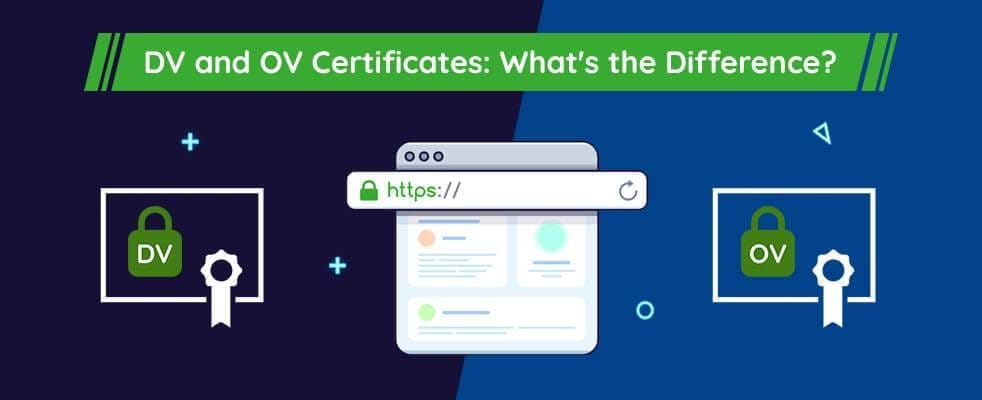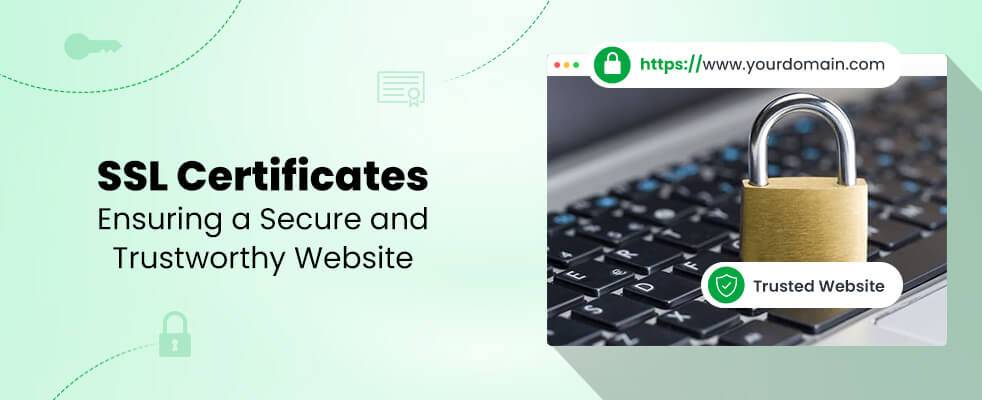
DV and OV Certificates: What’s the Difference?
Ensuring the security and trustworthiness of your website is paramount in today’s digital landscape. When it comes to SSL Certificates, understanding the difference between Domain Validated (commercial) and Organization Validated(trusted) certificates is crucial. In this blog we will explore each certificate type to help you choose the correct SSL certificate. Learn how digital certificates can enhance your data security, search engine results, organic search results, and search engine rankings.
What is a DV Certificate?
A Domain Validated (DV) Certificate is a type of SSL certificate that provides basic encryption for websites. It is the simplest and most affordable SSL certificate available in the market for small businesses or personal website security. The domain name owner only needs to prove ownership. To prove ownership, you need to click on a link sent in an email.
By acquiring a DV certificate, your website takes a significant step towards enhanced security. The presence of HTTPS in your URL signifies that your visitors’ sensitive data, is shielded from malicious attacks. It’s a reassuring sign that their information is encrypted and protected against cyber threats.
However, it’s important to note that DV certificates solely validate the domain registration and lack verification of your company’s originality. While data encryption during transmission mitigates risks, interacting with unverified entities online still poses potential hazards. Therefore, for businesses seeking stronger trust and credibility, considering additional validation options is crucial in establishing a secure online presence.
To determine if a DV certificate is right for your website, carefully assess the sensitivity and amount of data being transmitted.
What is an OV Certificate?
An Organization Validated (OV) Certificate, is a type of SSL/TLS digital certificate that provides a higher level of trust and security. The Certificate Authority conducts a validation process to ensure that the organization requesting the certificate is legitimate.
The CA verifies various pieces of information about your organization such as its legal existence, address, and phone number. This process helps to confirm that your business is genuine and trustworthy before issuing you with an OV certificate.
The company name in browsers’ address bars indicates to users that they are visiting a verified website. This visual cue can help build customer confidence by providing reassurance about their data security when browsing your site.
OV certificates offer better protection against phishing attacks and other online fraud because they require more rigorous verification procedures for businesses. Despite the higher cost, OV certificates are perfect for businesses to demonstrate their commitment to encrypted data, security, and trustworthiness.
The Difference Between DV and OV Certificates
Remember, choosing the right SSL certificate is essential for safeguarding your website and establishing credibility with your audience. Let’s dive into the details and shed light on the distinctions between Domain Validated and Organization Validated certificates. We are empowering you to make the best choice for your online presence.
| Features | DV Certificate | OV Certificate |
|---|---|---|
| Validation Process | Simple and quick validation process | Rigorous validation of domain and business |
| Validation Level | Basic encryption | Higher level of validation and trust |
| Level of verification | Domain name ownership only | Domain name ownership and organization information |
| Trust Indicators | Padlock symbol and “https” in the web browser bar | Padlock symbol, “https,” and verified organization details |
| Cost | Less expensive | More expensive |
| Security | Basic | Enhanced |
| Recommended Use Cases | Personal websites, blogs, information sites | Business websites, e-commerce platforms, sites handling sensitive data |
In-Depth Comparison:
- Validation Process
- Domain Validated Certificates go through a simple and quick domain validation process. The certificate authority confirms domain ownership by checking the WHOIS database or connecting via email.
- Organization Validated Certificates involve a more rigorous validation process. In addition to verifying domain ownership, the certificate authority also validates the existence and legality of the organization. This process includes verifying the legal, physical, and operative details.
- Validation Level and Trust
- Domain Validated Certificates provide basic encryption work and are suitable for protecting data of personal websites, blogs, or informative websites. While they offer encryption, they do not provide additional trust indicators beyond securing the connection.
- Organization Validated Certificates offer a higher level of validation and provide additional trust indicators to website visitors. These certificates display verified organization information in the certificate details, demonstrating higher credibility and trustworthiness.
- Trust Indicators
- Domain Validated Certificates typically display a padlock symbol and “https” in the browser’s address bar, indicating a secure connection. However, they do not display verified organization information.
- Organization Validated Certificates secure data encryption of a website by displaying the padlock symbol and “https”. It also shows the verified organization information, like the organization name, 0n the certificate. This visible validation provides visitors with an additional layer of trust.
- Use Cases and Recommendations
- Domain Validated Certificates are suitable for websites that classify encryption as their prime requirement. These websites include personal blogs, informative websites, or small-scale e-commerce sites.
- Organization Validated Certificates are for business websites, e-commerce platforms, and other websites that handle sensitive customer data. The visible organization validation helps build trust with visitors, especially for online transactions.
How to Get a DV or OV Certificate?
Acquiring a DV or OV certificate is mandatory to ensure your website’s security. Here are the steps you need to follow to get one:
Decide which type of certificate is best for your needs. If you require basic encryption, a DV certificate may suffice. However, if you need additional assurance regarding the company’s identity behind the website, an OV certificate is recommended.
Then, generate a Certificate Signing Request (CSR). Security measures are executed on your web server or hosting provider account. You’ll provide essential information about your domain name and organization to ensure a secure environment.
After generating the CSR, login to your ConnectReseller account and place an order for SSL Certificate.
- Commercial Certificate is Domain Validated (DV) Certificate
- Trusted Certificate is Organization Validated (OV) Certificate
Submit CSR while placing the order along with any additional documentation required for verification. Your domain ownership and organizational details will be verified based on the Verification Method opted by you before issuing your SSL/TLS certificate.
Once issued, install the SSL/TLS certificate on your web server or hosting provider account according to their instructions. After installation completes, successfully test it by accessing https://yourdomain.com
By taking these steps, you can keep your website’s data safe from unauthorized access and boost your search engine rankings. Google values websites that use encrypted connections, rewarding them with better organic search results.
Conclusion
ConnectReseller.com provides reliable and trusted DV and OV certificates, ensuring you have the benefit of SSL Certificates for your client’s business. Choosing the appropriate SSL certificate for your website is crucial for securing your online presence and building trust with visitors.
While DV certificates provide basic encryption, OV certificates offer a higher level of validation and additional trust indicators. If you want basic security and don’t need to show your commitment to trust, go for a DV certificate. Wish to provide your visitors with more security and trust, in that case, an OV certificate would be the preferred choice.
Assess your website’s needs and the level of trust you wish to establish with your audience before deciding. Choose wisely and experience the benefits of a trusted and secure website.



